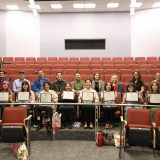Turning Anguish into Purpose with Jimmie C. Gardner Wilkinson's Engaging the World: Leading the Conversation on the Significance of Race
September 30, 2020
Earlier this week Wilkinson College and the Fowler School of Law joined forces to bring judicial reform advocate, Jimme C. Gardner, who was wrongfully convicted and imprisoned for more than 27 years before being exonerated, back to Chapman as part of the Chapman Dialogue Series and Wilkinson’s Engaging the World: Leading the Conversation on the Significance of Race initiative.
Gardner opened up about his reasons for sharing his story.
“You [Chapman students] all are the future, so everything I have, I share with you because I know you will be running this country and you will be in positions of authority over individuals and I want you to show empathy. I want you to understand [we] need people in positions of authority so we can keep this country peaceful and as wonderful as we can. You are the future to do that.”
This time around Gardner sat down with Wilkinson College Dean Jennifer D. Keene and got personal about his time as a young, Black boy living in Tampa Bay, Florida, playing in the minor leagues straight out of high school and some of his experiences during his time in prison.
Gardner was drafted in 1983 by the Chicago Cubs and played with them in the minor league for four seasons.
“I played with hall-of-famers, had some wonderful friends. When I was charged and convicted all that went away.”
While on the Charleston Wheelers minor league baseball team in 1990, he was convicted of robbing and sexually assaulting two women and sentenced to 110 years, that’s when, “the horrible nightmare began.”
Gardner speaks candidly about the time leading up to his conviction. West Virginia law enforcement officers were looking for a Black man with light-skin and about 6 feet tall. Gardner describes himself as a dark-skinned Black man, 6’4 in height. The night of the incident, Gardner was pitching a game with his team. The prosecution claims he pitched a couple of innings, left the game, did the crime, and went back to the game. “That’s ludicrous,” said Gardner.
A year after Gardner was questioned, fingerprinted, gave DNA and saliva samples, he was arrested, and although he always maintained his innocence, he was put on trial and found guilty a month later. At Gardner’s criminal trial, a state police forensic scientist was the expert witness, and knowingly presented false testimony which resulted in Gardner’s guilty verdict. “Fred Zane was a DNA expert. He falsified evidence and included me as a suspect,” said Gardner.
Even though Zain was under investigation and the West Virginia Supreme Court issued a statement that Zain had in fact falsified evidence in criminal prosecutions, Gardner spent another 23 years in prison before getting a hearing in 2013.
Gardner spent those years educating himself with the law. He went through 13 attorneys, none of which filed habeas corpus. He argued with them all and by the end, knew more about the courts then they did. “I wouldn’t stop. I wouldn’t give up.”
On March 25, 2016 Gardner received a call from his attorney. Gardner remembers it was 9:15 a.m. and his attorney said, “Are you sitting down? Today your conviction was overturned.”
“I am thankful. I didn’t beat the system. I received relief after 27 years. I was one of the few fortunate to make it home.”
Gardner is currently a full-time student at Chapman University, his attendance made possible with a full-ride Presidential Scholarship.
Want to hear more of Jimmie C. Gardner’s incredible story. Watch the Zoom recording here.



